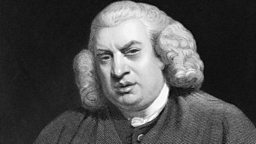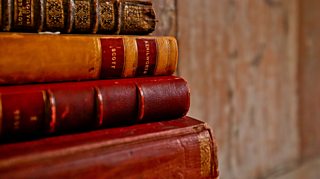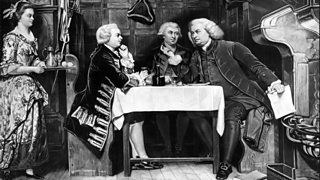The remarkable hidden life of London writer Samuel Johnson
Naomi Alderton discovers the idiosyncratic, contrarian, chaotic and extremely generous sides of Samuel Johnson, the “hack” writer who almost single-handedly wrote a seminal English dictionary.
Despite struggling with ill-health and poverty, he was ahead of his time in showing support for women writers and opposing slavery. Here are seven things we learnt in this episode of Human Intelligence:

He had a difficult start in life
Samuel was born in Lichfield, Staffordshire in 1709. His father was a bookseller, so his mind was nourished by literature at an early age, but physically he suffered with scrofula, a tuberculosis of the lymph nodes.

His family was poor and couldn’t afford to keep him at Oxford University beyond a single term, so he moved to London at an early age. However, as Naomi notes, Samuel's London was not “the London of the fancy balls and silk outfits of fashionable sets and court visits – Samuel's life was lived in dingy back alleys and grotty garrets.”
His time in London was not glamorous
While he very much believed in his own epigram that “when a man is tired of London, he is tired of life; for there is in London all that life can afford,” Samuel’s life was a struggle. He lived hand-to-mouth as a “hack” or writer-for-hire, writing for an audience who were curious about ideas without actually being academics.
He was very interested in how people used language
Despite scraping a living, Samuel was recognised for his ability to quickly master and process a wide range of subjects and was invited by a consortium of publishers to write a dictionary.
Samuel brought more than just a corrective approach to language, notes Judith Hawley, professor of 18th-Century literature at Royal Holloway, University of London. “He realised that language was a living thing,” Hawley says, adding: “His real interest was not so much in linguistic theory, but in books and thinkers and how people who had something to impart to the world used language.”
After his dictionary was published in 1755, Samuel, according to Judith Hawley “was approached by a group of respectable ladies who praised him and said ‘We were so glad, Mr. Johnson, that you left out all the rude words.’ To which he replied, ‘I'm very impressed, ladies, that you're actually looking for them.’”
Samuel was also praised by the Earl of Chesterfield, who described the dictionary as “as near to perfection as any one man could do.” Samuel, however, recalled that the Earl had once fobbed him off when he was looking for help with the book. He wrote to Chesterfield to rebuke his praise, informing him it was too late.
He was a chaotic worker who endured health challenges
By all accounts, he worked in a very messy office. His home was squalid and his books and papers were strewn all over the place. His working environment wasn’t made any easier by Samuel being surrounded by what Naomi describes as “a team of assistants and amanuenses [literary assistants], as well as a busy and often argumentative personal household.”
He is always very generous... to people he saw as less fortunate than himselfJudith Hawley
Samuel's hearing and eyesight were poor, and he had physical tics that are now thought to have been caused by Tourette's Syndrome. The painter William Hogarth said that when he first met Samuel, he thought he was “an idiot boy,” but when Samuel began to talk, he was so eloquent and witty that it was obvious that he had a brilliant mind.
He was incredibly supportive of others and generous financially
A complicated character, Samuel was combative and contrarian but also enthusiastic and supportive, including of women writers Fanny Bernie and Mary Wollstonecraft. Samuel doted on his wife, Elizabeth Porter, nicknamed Tetty, who was 20 years his senior. He was also attentive to the rest of the household which, at any one time, included up to seven “semi-vagrant” people, among them the poet Anna Williams.
When one of his secretaries got into trouble, Samuel paid £20 – nearly a year’s wages – to bail them out. “He never had any money,” says Judith Hawley, “but he is always very generous with it to people he saw as less fortunate than himself.”
After his death in 1784, with his wife having died in 1751, Samuel’s instructions saw that his estate was passed to his Jamaican servant, Francis Barber.
He was a vocal abolitionist
Francis Barber had been a slave in Jamaica before being brought to the UK by his owner. He served in the British Navy during the Seven Years War before joining Samuel’s household.

Samuel was himself an abolitionist who took every opportunity to voice his opposition to slavery. His biographer, James Boswell, wrote that Samuel was once invited to give a toast at Oxford University and raised his glass to toast the next insurrection in the West Indies.
He was hugely influential in defining the English language
Naomi says that Samuel’s achievements “were vast in his lifetime”. “If a dictionary is a map of language,” says Naomi, “then I'd argue that through his work on the dictionary, through his wit, his shade, his incredibly quotable and repeatable epigrams, Samuel Johnson's personality has made a permanent imprint on the English language, and perhaps on the very idea of Englishness.”
More to discover
-
![]()
Human Intelligence
Great Minds Don't Think Alike. Naomi Alderman dissects the minds of brilliant thinkers from the past; examining the myriad ways in which humans think.
-
![]()
You're Dead To Me
The comedy podcast that takes history seriously. Greg Jenner brings together the best names in comedy and history to learn and laugh about the past.
-
![]()
In Our Time
Melvyn Bragg and guests discuss the ideas, people and events that have shaped our world
-
![]()
History's Heroes
Nicola Coughlan and Helena Bonham Carter shine a light on extraordinary people from history.




